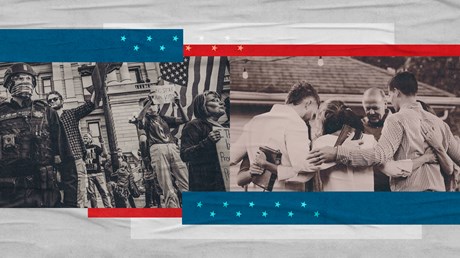Christians have always been called to love place and neighbor over the power of state.

In sixth grade, I won my first college scholarship in a local Veterans of Foreign Wars essay contest on the question “What does it mean to be patriotic?” My winning entry fetched $50, enough for at least half a textbook. The essay is long lost, but I vaguely recall being inspired by a trip to Virginia’s Colonial Williamsburg, where I’d been enthralled by the commercialized mythology of American founders like Thomas Jefferson, tried my first limeade, and left clutching an etiquette book penned by George Washington himself.
The question isn’t so easily answered now. What does it mean to be patriotic, and should Christians even want to be? What does it mean, as an American evangelical, to mark July 4 after January 6, when supporters of our former president—many of them professing evangelical Christians, many clad in red, white, and blue—overran the US Capitol in attempted sedition?
My Anabaptism always has me treading lightly here, but I think Christians can be rightfully patriotic. The crux of the matter is what that patriotism entails: Is it love of our place and neighbors, or love of the state and its power?
American patriotism is too often the latter. It frequently indulges in jingoism, pride, militarism, and idolatrous civil religion. It is competitive, aggressive, and offended by even constructive criticism: “Love it or leave it” is the familiar refrain. It takes words Jesus used for the people of God—the “city on a hill” language drawn from Matthew 5:14 by Presidents John F. Kennedy, Ronald Reagan, and Barack Obama—and exploits them for political ends. It is, as C. S. Lewis put it in The Four Loves, “a firm, even prosaic belief that ...
from Christianity Today Magazine
via


.gif)

.gif)
.gif)
